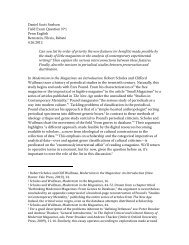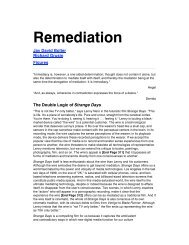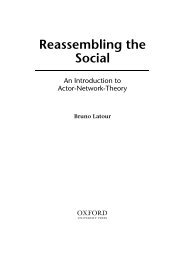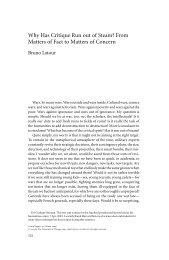The Exploit: A Theory of Networks - asounder
The Exploit: A Theory of Networks - asounder
The Exploit: A Theory of Networks - asounder
You also want an ePaper? Increase the reach of your titles
YUMPU automatically turns print PDFs into web optimized ePapers that Google loves.
170 Notes<br />
that threaten the political - economic infrastructure <strong>of</strong> society. But what is striking<br />
is how thinkers on opposite sides <strong>of</strong> the fence politically—such as Hobbes<br />
and Spinoza—agree that the greatest threat to political order comes from<br />
within: civil war, rebellion, factionalism, and mob rule.<br />
13. Deleuze, Negotiations, 180. We note, in passing, that such a networked<br />
theory <strong>of</strong> power is in many ways presaged in Foucault’s theses concerning<br />
“biopower” in the first volume <strong>of</strong> <strong>The</strong> History <strong>of</strong> Sexuality.<br />
14. As the media theorist Vilém Flusser notes, in the network society<br />
“we will have to replace the category <strong>of</strong> ‘subject - object’ with the category <strong>of</strong><br />
‘intersubjectivity,’ which will invalidate the distinction between science and<br />
art: science will emerge as an intersubjective fiction, art as an intersubjective<br />
discipline in the search for knowledge; thus science will become a form <strong>of</strong> art<br />
and art a variant <strong>of</strong> the sciences.” Vilém Flusser, “Memories,” in Ars Electronica:<br />
Facing the Future, ed. Timothy Druckrey (Cambridge: MIT Press, 1999), 206.<br />
15. But this is a paradoxical formulation. According to the technical histories<br />
<strong>of</strong> the concept <strong>of</strong> “information,” information cannot matter. Indeed,<br />
the familiar associations <strong>of</strong> cyberspace, e - commerce, virtual identities, and<br />
s<strong>of</strong>tware piracy all have to do with a notion <strong>of</strong> “information” as disembodied<br />
and immaterial, just as the practices <strong>of</strong> cyberwar and netwar do—and yet<br />
with material consequences and costs. Indeed, such a view <strong>of</strong> information<br />
has infused a number <strong>of</strong> disciplines that have traditionally dealt with the<br />
material world exclusively—molecular biology, nanotechnology, immunology,<br />
and certain branches <strong>of</strong> cognitive science.<br />
16. <strong>The</strong> standards for hardware platforms, operating systems, networking<br />
protocols, and database architectures are all examples drawn from the computer<br />
and information technology industries. <strong>The</strong> ongoing development <strong>of</strong><br />
laboratory techniques, the production and handling <strong>of</strong> medical data, and<br />
policies regarding the distribution and circulation <strong>of</strong> biological materials are<br />
examples in the life sciences.<br />
17. See Lily Kay, Who Wrote the Book <strong>of</strong> Life? A History <strong>of</strong> the Genetic<br />
Code (Stanford: Stanford University Press, 2000); and Evelyn Fox Keller,<br />
Refiguring Life: Metaphors <strong>of</strong> Twentieth - Century Biology (New York: Columbia<br />
University Press, 1995).<br />
18. David Bourgaize, Thomas Jewell, and Rodolfo Buiser, Biotechnology:<br />
Demystifying the Concepts (New York: Addison Wesley Longman, 2000), 30.<br />
19. Francis Crick, “On Protein Synthesis,” Symposium <strong>of</strong> the Society for<br />
Experimental Biology 12 (1958): 144.<br />
20. See Alan Dove, “From Bits to Bases: Computing with DNA,” Nature<br />
Biotechnology 16 (September 1998); and Antonio Regalado, “DNA Computing,”<br />
MIT Technology Review, May– June 2000. Biocomputing includes sub -<br />
areas such as protein computing (using enzymatic reactions), membrane<br />
computing (using membrane receptors), and even quantum computing (using<br />
quantum fluctuations). Other “nonmedical” applications <strong>of</strong> biotechnology in -









